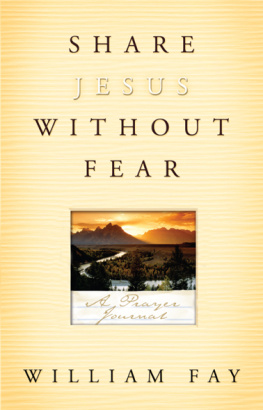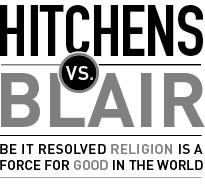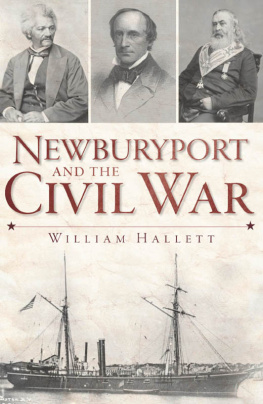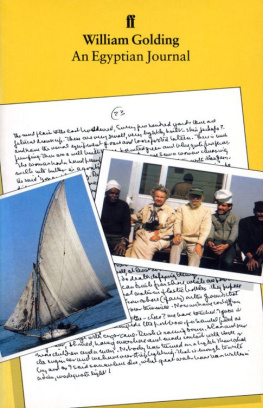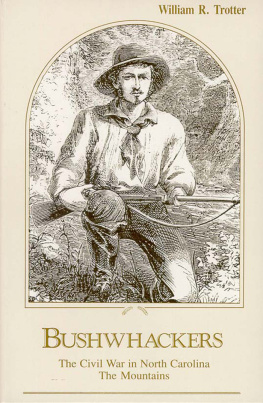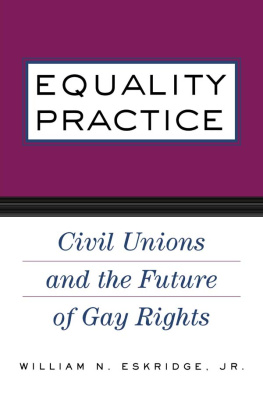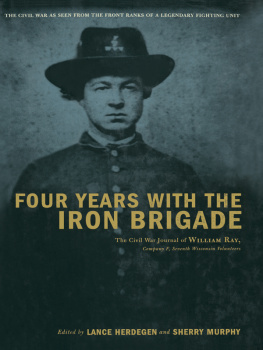EDITOR
William Blair, The Pennsylvania State University
ASSOCIATE EDITORS
Judith Giesberg, Villanova University, Book Reviews
Anthony E. Kaye, The Pennsylvania State University
Kate Masur, Northwestern University
MANAGING EDITOR
Matthew Isham, The Pennsylvania State University
EDITORIAL ASSISTANT
William Cossen, The Pennsylvania State University
EDITORIAL BOARD
Stephen V. Ash, University of Tennessee
Nancy Bercaw, Smithsonian Institution
Stephen Berry, University of Georgia
David Blight, Yale University
Peter Carmichael, Gettysburg College
Gary Gallagher, University of Virginia
Thavolia Glymph, Duke University
Stephanie McCurry, University of Pennsylvania
Tiya Miles, University of Michigan
Christopher Morris, University of Texas at Arlington
Carol Reardon, The Pennsylvania State University
Seth Rockman, Brown University
Leslie Schwalm, University of Iowa
Nina Silber, Boston University
SUBSCRIPTIONS
A one-year subscription (four issues) is available to individuals for $50 and institutions for $85. Members of the Society of Civil War Historians receive a subscription to The Journal of the Civil War Era as a benefit of membership. To subscribe or for information on single issues, please contact Suzi Waters at: Journals Department, The University of North Carolina Press, 116 S. Boundary Street, Chapel Hill, NC 27514. Tel: 919-962-4201. Email: UNCPress_Journals@unc.edu
CHANGE OF ADDRESS
Please send your old and new addresses to Suzi Waters at the above address. Allow at least six weeks for a change of address.
EDITORIAL SUBMISSIONS
Manuscript submissions and inquiries about guidelines should be sent to William Blair, Editor, The Journal of the Civil War Era, at wab120@psu.edu. Manuscripts should be no more than 11,000 words, counting notes. Queries concerning book reviews should go to Judith Giesberg at judith.giesberg@villanova.edu.
Copyright 2014 The University of North Carolina Press.
ISSN: 2154-4727 www.journalofthecivilwarera.com
THE GEORGE AND ANN RICHARDS CIVIL WAR ERA CENTER
The editorial home for the journal is the Richards Civil War Era Center, The Pennsylvania State University, 108 Weaver Building, University Park, PA 16802. The Richards Center serves as a research and outreach initiative within the Department of History at Penn State with a focus on themes relating to the freedom struggle, spanning from slavery to Civil Rights. The main priority of the Center is fostering cutting-edge research and enhancing the training of graduate students. The Richards Center is also committed to sharing the results of innovative scholarship with the public through lectures, public study tours, symposia, and undergraduate internships at national parks.
Contents
Editors Note
Today it sounds strange, if not outrageous, but serious discussion once existed over whether to create a segregated zone in the United States for the relocation of African Americans. This so-called internal colonization movement, according to one such plan raised in 1865, would have created a territory for black people out of contiguous land in South Carolina, Georgia, Alabama, and Florida. One person dismissed the plan as a strange hallucination, and it obviously went nowhere. Nicholas Guyatt traces the strange career of this idea, indicating that it had appeared in the United States earliest days and circulated even after the Civil War.
The collision over ideasand the analysis of which ones become policy and which ones do notruns as a theme through many of the articles in this issue of The Journal of the Civil War Era. The discussion opens with the acceptance speech by John Fabian Witt, winner of the Tom Watson Brown Book Award for the best book published in 2012. Lincolns Code: The Laws of War in American History details the way law, and a code of conduct for warfare, played a strong role in how the conflict unfolded. Law, Witt says, shaped a story usually told through bullets and the Springfield rifle. Chandra Manning takes a fresh look at contraband camps, revealing how the encounters between African Americansparticularly womenand army officers created new ideas about obligation, reciprocity, and rights. And Michael F. Conlin conducts the most comprehensive analysis to date about the ideological siege in which many southerners envisioned themselves against ismsamong them Mormonism, Transcendentalism, abolitionism, and socialism. But Conlin argues that this sense of an assault on gender relations, law, private property, and even the Bible was not only a southern phenomenon but also was shared by northern conservatives who saw isms as part of a program imported from Europe.
In a review essay, John Craig Hammond continues to explore the United States in a wider world as he charts how the country forged an empire for slavery in the century from the Seven Years War to the Civil War. In doing so, he argues that scholars can gain an appreciation for the continuities between the eighteenth and nineteenth centuries and see African American history within the broader hemispheric struggle for freedom.
Ideas about the Civil War continue to come into play in our contemporary lives. Assessing the state of the sesquicentennial in representing slavery, abolition, and Reconstruction, Jill Titus sees considerable progress from the way these issues were neglected during the centennial. But she sees challenges ahead in shaping the public understanding of the conflict in public commemorations. For instance, how can we deal with the crushing realities of the slave market, and how can battlefield parks attract more African American visitors? More work lies ahead in this regard.
Tom Watson Brown Book Award
Civil War Historians and the Laws of War
JOHN FABIAN WITT
EDITORS NOTE: The following represents the acceptance speech for the Tom Watson Brown Award for the best book published on the Civil War era in calendar year 2012. Tad Brown, president of the Watson-Brown Foundation, awarded the prize to John Fabian Witt for his book, Lincolns Code: The Laws of War in American History, published by the Free Press. Reproduced in their entirety, these remarks were given at the annual banquet of the Society of Civil War Historians (SCWH), held during the Southern Historical Association annual meeting on November 1, 2013 in St. Louis, Missouri. The SCWH judges and administers the book prize.
It is a thrill to be here this evening to receive the Tom Watson Brown Book Prize from the Society of Civil War Historians and the Watson-Brown Foundation. I am principally a historian of American law. It has not escaped my attention that I did not come to my book project as a certified Civil War historian. In fact, I spent much of the seven years during which I wrote the book in a state of abject terror at the errors of fact and interpretation that real Civil War historians would identify once it was published. A challenge I put to myself was to imagine the members of this society as my readers and to try to meet your standards. If I have come close to doing that, I am truly pleased.
What I want to talk to you about tonight is the problem of the laws of war in history and in the history of the Civil War in particular. What Id like to do is banish some misconceptions about how law figures in history and to suggest the beginnings of a way for historians of the Civil War to think about law in the midst of armed conflict. For make no mistake about it: the question of whether law matters in moments of war is a fraught one, with a long history going back to Cicero, who warned that the law fell silent in times of war; running through Cervantes, who coined the phrase all is fair in love and war; and reappearing regularly in the modern world right up into the present day. Some disillusioned law professors have thought that in hell there is nothing but law. But if Sherman ever really did say, War is hell, we can be pretty sure that he meant there was no law there at all.




